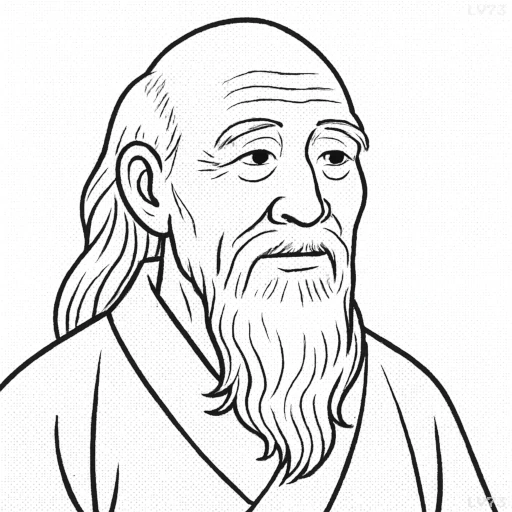“There was something undifferentiated and yet complete, which existed before Heaven and Earth. Soundless and formless, it depends on nothing and does not change. It operates everywhere and is free from danger. It may be considered the mother of the universe. I do not know its name; I call it Tao.”

- 571 BC? – 470 BC?
- Born in China
- Philosopher
table of contents
Quote
“There was something undifferentiated and yet complete, which existed before Heaven and Earth. Soundless and formless, it depends on nothing and does not change. It operates everywhere and is free from danger. It may be considered the mother of the universe. I do not know its name; I call it Tao.”
Explanation
This quote from Laozi describes the Dao (Tao) as the fundamental, mysterious force that existed before the creation of the world—before Heaven and Earth. Laozi characterizes the Dao as undifferentiated, meaning it is beyond all distinctions and opposites, yet it is complete in itself. It is formless and soundless, existing in a state of pure potential, and is the source of all creation. The Dao does not rely on anything external and does not change; it is eternal and unaffected by time or circumstances. Laozi calls the Dao the mother of the universe, implying that it is the source from which everything originates, but it remains beyond the reach of human understanding or definition. Laozi confesses that he does not know its true name, but calls it Dao, the “Way” or the “Path,” because it is the underlying principle that governs all things without being directly observable or definable.
This description of the Dao aligns with Daoist philosophy, which teaches that the ultimate truth and source of all life cannot be grasped through conventional intellectualization or words. It is not something that can be easily explained or understood, but rather something to be experienced through living in harmony with it. Laozi’s words invite us to recognize the limitations of language and the inability of human minds to fully grasp the ultimate nature of existence.
In modern life, this concept of the Dao encourages us to embrace the unknown and live with a sense of humility and acceptance of life’s mysteries. The Dao reminds us that the most profound truths cannot always be explained or controlled, and often, the most powerful forces are the ones that flow effortlessly through life, beyond our ability to define or direct. Laozi’s wisdom teaches that instead of trying to force outcomes, we should align ourselves with the natural rhythms and cycles of life, just as the Dao operates freely and without resistance. The Dao shows us that true wisdom comes from recognizing the invisible and unseen forces at work in the universe, and living in harmony with them.
Would you like to share your impressions or related stories about this quote in the comments section?
